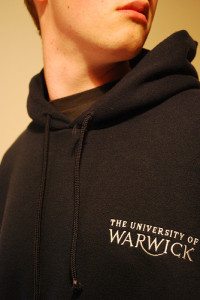Warwick branded clothing accused of ‘sweatshop labour’
Warwick branded clothing could be being produced using unethical sweatshop labour, according to the founder of a new campaign group on campus.
Frank Davies, second-year Philosophy and Literature student and founder of the ‘Sweatshop Free Warwick Uni’ campaign, alleges that at least two suppliers of Warwick branded clothing could be involved in labour exploitation in developing countries, and he is investigating a third.
He is calling for Warwick to affiliate itself with the Worker Rights Consortium (WRC), an independent labour rights monitoring organisation with over 175 affiliated universities, mostly in the United States.
On Tuesday Andrew Taylor, Buy Right Campaign manager at People & Planet who advised Mr Davies on his campaign, sent an email, seen by the Boar, to Warwick’s Vice Chancellor Nigel Thrift urging him to sign a declaration of ‘intent to take action’ on sweatshops and urging Warwick to affiliate with the WRC.
“The University [of] Warwick spending in 2012 was £109,000 a year on garments alone,” says the email.
“In addition it is our belief that the amount spent by universities on the procurement of electronics and computing products is far greater. As Vice-Chancellor we are asking you to support our campaign to prevent university garments and electronics being produced in sweatshops.”
11 UK universities, including nearby University of Birmingham, are affiliates of the WRC.
A spokesperson for Warwick, Peter Dunn, confirmed receipt of the letter, but said Prof Thrift had just gone for his annual leave: “I am sure he will consider it on his return but he will of course have to consult with colleagues in the related administrative functions.”
Mr Taylor told the Boar: “A lot of the [factory] audits are funded by the corporations themselves…The factories are aware that [the inspectors] are coming. The staff are a lot less likely to speak out in front of the management of the factory.”
He added: “Working through the WRC model we’ve seen these massive structural changes that have been achieved because of the model and the work that’s been achieved in the US.”
In a report published on the campaign’s Facebook page, Mr Davies criticises companies JSW Marketing and T-Print which supply university branded clothing, including hoodies and t-shirts sold through Warwick Bookshop.
JSW Marketing bills itself as the “longest serving supplier to NUSSL [National Union of Students Services Ltd]” and uses supplier Cottonridge for its garments.
As of September 5, Cottonridge’s website states it is a member of Worldwide Responsible Accredited Production (WRAP) as well as Sedex, an organisation “dedicated to driving improvements in ethical and responsible business practices in global supply chains”.
Mr Davies claims in the report, however, that Cottonridge’s WRAP certificate number ‘8398’ listed on JSW Marketing’s website does not exist.
WRAP’s United States office told the Boar the certificate number ‘8398’ belongs to Ayesha Fabrics, a factory in Pakistan.
A spokesperson for Cottonridge Rob Joyce said the information on their website “must be out of date, probably from a prior certification that is now invalid.”
He cited a new WRAP certification number ‘7910’, which WRAP lists as Hi-Knit (Pvt) Ltd (Garment Division) located in the Korangi Industrial Area of Karachi, Pakistan, one of the country’s largest industrial areas. The certificate is valid with an expiry date of 7 February 2014.
Lancashire-based T-Print uses Fruit of the Loom and its subsidiary Jerseez as two of its suppliers. Fruit of the Loom has cooperated with factory workers at its Nuevo Día Jerseez factory in Honduras to improve working conditions.
However, Mr Davies alleges that other facilities run by the company use unethical practices and maintains that this “looks like a move to appease anti-sweatshop campaigners rather than a genuine commitment to ethical production”.
Mr Davies said: “Something to bear in mind is that both of those institutions [WRAP and Sedex] are more or less rubber-stamp bodies for companies to get ‘ethical’ standards.
“WRAP registers factories, not companies that order from them, so it’s difficult to check. This is on purpose. The reason I say they’re rubber-stamp bodies is because… their conditions are very pro-employer because they focus on enforcing the law rather than protecting workers and in many of the countries where the factories are, health and safety etc. is very lax.”
The third company Mr Davies is investigating is Concept International, but he has yet to allege any wrongdoing.
The campaign’s Facebook page had 485 ‘likes’ as of Thursday 5 September.


Comments